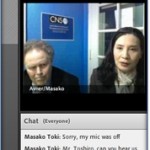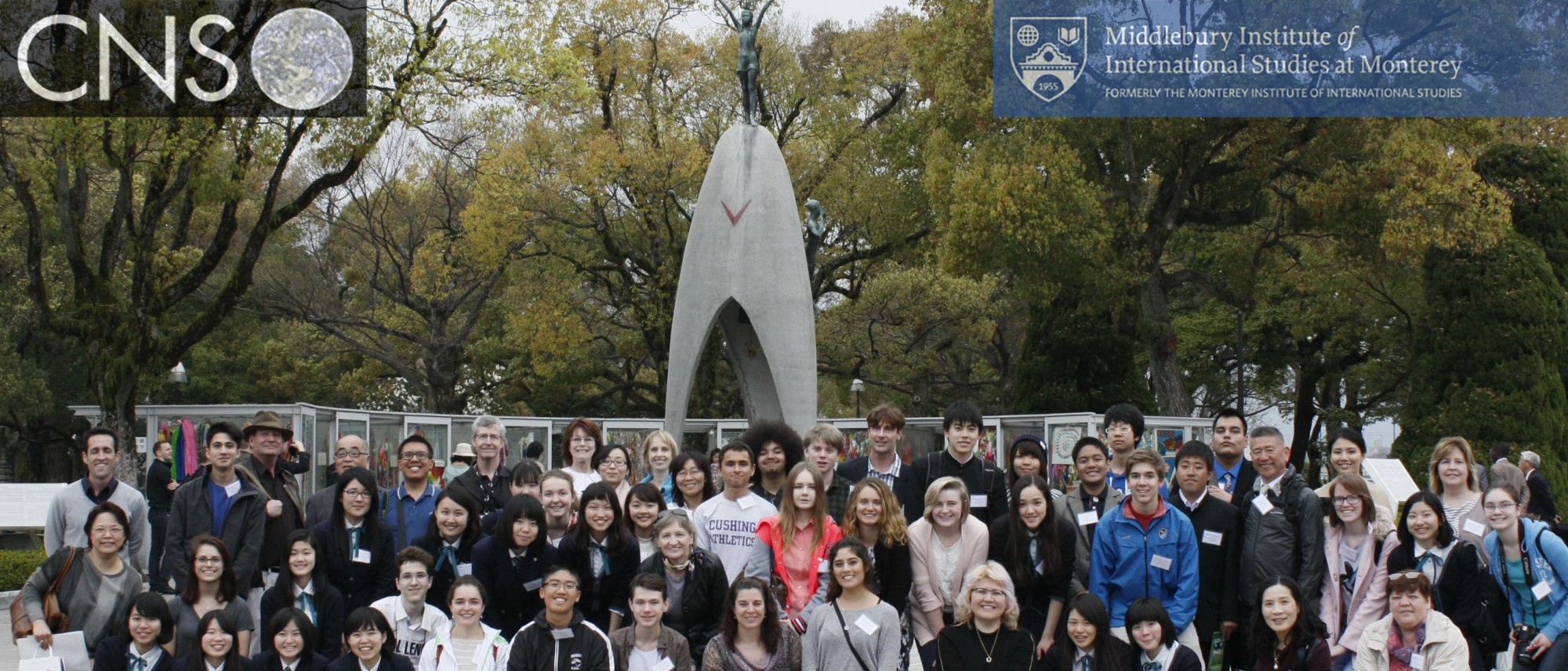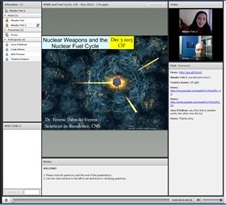 CNS Education Director, Dr. Avner Cohen and Project Manager, Masako Toki Greeting to CIF Teachers through Adobe Connect
CNS Education Director, Dr. Avner Cohen and Project Manager, Masako Toki Greeting to CIF Teachers through Adobe Connect
2013-2014 Critical Issues Forum Project Starts with Online Teachers Workshop
As a first event of the academic year 2013-2014 Critical Issues Forum (CIF) project, CNS conducted an online teachers’ workshop during the first and second weeks of December. CIF is a flagship nonproliferation and disarmament education project for high school students and teachers in the James Martin Center for Nonproliferation Studies. This workshop was the first to be conducted completely online. CNS has recently enhanced its efforts in online education to promote nonproliferation and disarmament in order to reach a wider international audience. For the workshop, we used Adobe Connect to bring teachers from Japan, Russia’s closed nuclear cities and several US states—all in different time zones.
Participants engaged both synchronously, concurrently with the online workshops, and asynchronously, at a later time more convenient for them. All workshop sessions were recorded and remain available on the CIF website for asynchronous viewing. This year’s CIF topic is Nuclear Nonproliferation: Global Opportunities and Regional Challenges. This topic reflects the current situation of nuclear nonproliferation, and is very timely, as the 2013-2014 CIF academic year falls into the run-up to the final session of the Preparatory Committee (PrepCom) for the 2015 NPT Review Conference. Accordingly, the spring CIF student conference will be held immediately before the final session of the PrepCom in April 2014. To begin the online workshop, CNS Education program director Dr. Avner Cohen gave introductory remarks after CIF project manager, Masako Toki, welcomed the participants. Dr. Cohen thanked all the participants for their commitment to disarmament and nonproliferation education. He also emphasized the importance of nonproliferation education, noting that the current challenging international nonproliferation situation requires more educational activities for younger generations. The workshop lectures covered global nonproliferation regimes, the current world status of nuclear weapons, the basics of nuclear science, US-Russia bilateral arms control, regional nuclear nonproliferation challenges, and prospects for the 2015 Nuclear Nonproliferation Treaty (NPT) Review Conference. The workshop also provided training sessions on how to cite sources appropriately and how to make effective presentations using presentation software such as PowerPoint. Dr. Jeffrey Knopf, Chair of Nonproliferation and Terrorism Studies at the Monterey Institute and Senior Research Associate at CNS gave a lecture laying out an overview of the current world nuclear status and proliferation concerns. Dr. Ferenc Dalnoki-Veress, Scientist-in-Residence at CNS, discussed the basics of nuclear physics, the dual nature of nuclear energy, and the nuclear fuel cycle.
Dr. George Moore, another Scientist –in-Residence, gave a lecture on International Atomic Energy Agency (IAEA) Safeguards, and how the IAEA plays an important role in nuclear nonproliferation regimes. Dr. Moore also clarified some common misunderstandings about the roles of the IAEA that many in the general public and even the media maintain. Ms. Amanda Moodie, Research Associate for the International Organization and Nonproliferation Program (IONP), focused on multilateral nonproliferation and disarmament regimes and the roles of international organizations in progress toward nuclear disarmament. Mr. Jon Wolfsthal, CNS Deputy Director, covered US-Russia bilateral arms control treaties, including an overview of the current status of the two countries’ nuclear arsenals, historical perspectives of bilateral arms control negotiations, and the path ahead. During the second half of the workshop, lectures were focused on current regional challenges in nuclear nonproliferation, including South Asia, the Middle East, and Northeast Asia. Dr. Chen Kane, a leading Middle East expert gave a comprehensive lecture on the nuclear challenges in the region and discussed the prospects of a Weapons of Mass Destruction–Free Zone (WMDFZ) in the Middle East. The workshop also covered prospects for the 2015 NPT Review Conference. Gaukhar Mukhatzhanova, Senior Research Associate at the CNS Washington, D.C. office, introduced the major challenges, discussed developments in the current NPT review process, and assessed the Actions Plans that were adopted at the 2010 NPT Review Conference.
After teachers have studied these topics using the online materials, they will work with their students at their own schools towards the spring conference that will be held in Monterey in early April. This year, we expect to have several Japanese high schools from Hiroshima and Nagasaki, US high schools from California, Maine, Connecticut, Hawaii, and Massachusetts, and schools from Russia’s closed nuclear cities. CNS is grateful to the US-Japan Foundation and the Tokyo Club for their support of CIF.
For the complete lecture videos, presentations, please visit the CIF website’s teachers workshop page: http://sites.miis.edu/criticalissuesforum/2013/12/02/2013-2014-cif-teachers-workshop/



